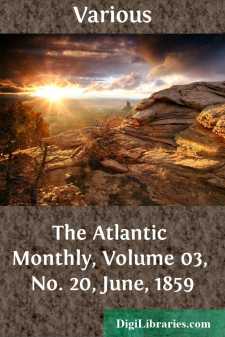Categories
- Antiques & Collectibles 13
- Architecture 36
- Art 48
- Bibles 22
- Biography & Autobiography 813
- Body, Mind & Spirit 142
- Business & Economics 28
- Children's Books 15
- Children's Fiction 12
- Computers 4
- Cooking 94
- Crafts & Hobbies 4
- Drama 346
- Education 46
- Family & Relationships 57
- Fiction 11828
- Games 19
- Gardening 17
- Health & Fitness 34
- History 1377
- House & Home 1
- Humor 147
- Juvenile Fiction 1873
- Juvenile Nonfiction 202
- Language Arts & Disciplines 88
- Law 16
- Literary Collections 686
- Literary Criticism 179
- Mathematics 13
- Medical 41
- Music 40
- Nature 179
- Non-Classifiable 1768
- Performing Arts 7
- Periodicals 1453
- Philosophy 64
- Photography 2
- Poetry 896
- Political Science 203
- Psychology 42
- Reference 154
- Religion 513
- Science 126
- Self-Help 84
- Social Science 81
- Sports & Recreation 34
- Study Aids 3
- Technology & Engineering 59
- Transportation 23
- Travel 463
- True Crime 29
The Atlantic Monthly, Volume 03, No. 20, June, 1859
by: Various
Categories:
Description:
Excerpt
SHAKSPEARE'S ART.
"Yet must I not give Nature all; thy Art,
My gentle SHAKSPEARE, must enjoy a part.
For though the poet's matter Nature be,
His Art doth give the fashion."—Ben Jonson.
Whoever would learn to think naturally, clearly, logically, and to express himself intelligibly and earnestly, let him give his days and nights to WILLIAM SHAKSPEARE. His ear will thus accustom itself to forms of phrase whose only mannerism is occasioned by the fulness of thought and the directness of expression; and he will not easily, through the habits which either his understanding or his ear will acquire, fall into the fluent cadences of that sort of writing in which words are used without discrimination of their nice meanings,—where the sentences are only a smoothly-undulating current of common phrases, in which it takes a page to say weakly what should be said forcibly in a few periods.
These are somewhat novel arguments for the study of one whom all the world has so long reverenced as "the great poet of Nature." But they may properly serve to introduce a consideration of the sense in which that phrase should be understood,—an attempt, in short, to look into Shakspeare's modes of creation, and define his relations, as an artist, with Nature.
We shall perhaps be excused the suggestion, that a poet cannot be natural in the same sense that a fool may be; he cannot be a natural,—since, if he is, he is not a poet. For to be a poet implies the ability to use ideas and forms of speech artistically, as well as to have an eye in a fine frenzy rolling. This is a distinction which all who write on poets or poetry should forever seek to keep clear by new illustrations. The poet has poetic powers that are born with him; but he must also have a power over language, skill in arrangement, a thousand, yes, a myriad, of powers which he was born with only the ability to acquire, and to use after their acquirement. In ranking Shakspeare the great poet of Nature, it is meant that he had the purpose and the power to think what was natural, and to select and follow it,—that, among his thick-coming fancies, he could perceive what was too fine, what tinged with personal vanity, what incongruous, unsuitable, feeble, strained, in short, unnatural, and reject it. His vision was so strong that he saw his characters and identified himself with them, yet preserving his cool judgment above them, and subjecting all he felt through them to its test, and developing it through this artificial process of writing. This vision and high state of being he could assume and keep up and work out through days and weeks, foreseeing the end from the beginning, retaining himself, and determining long before how many acts his work should be, what should be its plot, what the order of its scenes, what personages he would introduce, and where the main passions of the work should be developed. His fancy, which enabled him to see the stage and all its characters,—almost to be them,—was so under the control of his imagination, that it did not, through any interruptions while he was at his labor, beguile him with caprices....












